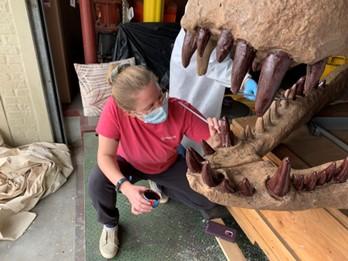KATC Meteorologist Jobie Lagrange visited Hamilton Hall to give a guest lecture about hurricanes for students in Int
New Geology Concentrations in Paleontology and Energy Resources for Fall 2023
Tue, 09/26/2023 - 3:21pm
New concentrations in the School of Geosciences prepare students for diverse careers within the growing private and public sector. Photo credit: Dr. Jennifer Hargrave
The School of Geosciences at the University of Louisiana at Lafayette has expanded and updated their undergraduate concentrations in Geology to meet the growing private and public sector demand for jobs in the Geosciences.
Starting this year, students seeking an undergraduate degree in Geology from UL Lafayette’s Ray P. Authement College of the Sciences can now choose from concentrations in Paleontology and Energy Resources. That’s in addition to existing Earth Sciences and Environmental Geology concentrations.
"The newest concentration in Paleontology includes courses in Micropaleontology, Invertebrate and Vertebrate Paleontology, as well as Museum Techniques and leverages the University’s new role overseeing the UL Lafayette Science Museum. Graduates of this concentration will be well prepared for careers in federal and state agencies, surveys, laboratories, and museums with additional career paths in the energy industry, mining and mineral industry, federal and state educational organizations, geospatial consulting companies, museum staff, and paleontology laboratory staff." Dr. Azmy S. Ackleh, Dean of the Ray P. Authement College of Sciences.
Our Bachelor of Science in Geology with a concentration in Energy Resources leverages Louisiana’s central role in the energy sector and is a great choice for students looking to pursue careers in the growing and diversifying energy industry. In addition, graduates of this concentration will be well prepared for careers in federal and state agencies and surveys, mining and mineral industry, and geospatial consulting companies.
There is surprising overlap between the Paleontology and Energy Sectors, notes Dr. Brian Schubert, Professor and Interim Director of the School of Geosciences. “Paleontologists are commonly hired into the energy sector for their expertise in correlating and dating economically viable deposits using fossils preserved in sedimentary rocks.” For this reason the Energy Resources concentration requires students take Paleontology or Micropaleontology to complete their degree. “This is just another example of how our School gives students highly marketable skills for which employers are looking,” added Schubert.
All the Geology concentrations require core courses in geology, including structural geology, field methods, stratigraphy, geophysics, and geochemistry, giving graduates a well-rounded foundation in Geology. Students can then choose among one of the four concentrations to complete their Geology major. In this way, the curriculum is designed to show employers that graduates have broad knowledge across Geology, and in-depth expertise within a particular area.
The new concentrations are strategic changes designed to meet student needs and industry demands, and to maximize opportunities for our students, said Schubert. “Geology is a dynamic and changing field. It’s critical that we’re responsive to those changes to best prepare students for ever-evolving workforce needs.”
According to the U.S. Bureau of Labor Statistics, the demand for Geoscientists in the private and public sector is expected to grow into the next decade. “The new concentrations are strategic changes designed to meet student needs and industry demands, and to maximize opportunities for our students,” said Schubert. Geology is also widely applicable to many diverse careers including Engineering Geology, Environmental Geology, Geohydrology, Oceanography, Climatology and numerous others, some yet to be defined as technology evolves.
Practicing geoscientists agree. William Finley, a current member and past chair of the Louisiana Board of Professional Geoscientists and adjunct faculty in the School of Geosciences, says that being a geologist requires integrating information into a complete and cohesive interpretation. “With these concentrations, the School of Geosciences has positioned itself well for students looking to pursue careers in the growing and diversifying energy industry and will make the student a more accurate evaluator and a more desirable employee,” added Finley.
Dr. Jennifer Hargrave, Museum Director and Senior Instructor in the School of Geosciences, said the inter-disciplinary nature and practicality of Geology means students can develop their existing knowledge. That includes, she added, students who don’t have a strong Earth Science background prior to starting their Geology program of study. “Geology is a very observational science. Geologists take their experiences and what they see around them to study the Earth,” Hargrave said. “Everything that you've learned, everything that you've done, both inside and outside the classroom, is applicable to the study of the geosciences.”
“By definition, Geology is the study of the Earth, including the water, atmosphere, and the land beneath our feet,” added Schubert. “It is therefore a very relevant science to where we work, live, and play – Geology is everywhere in our daily lives.”
Learn more at the School of Geosciences (https://geos.louisiana.edu/academic-programs/geology).
